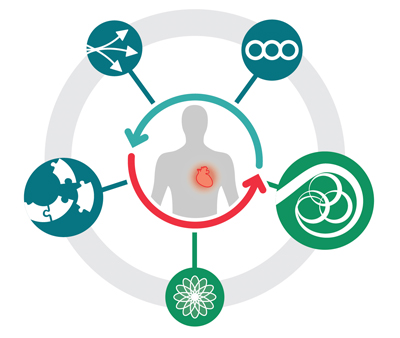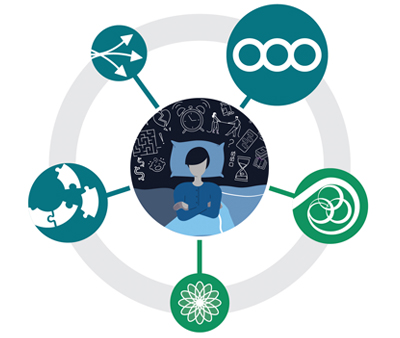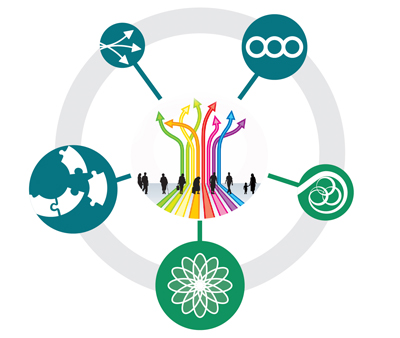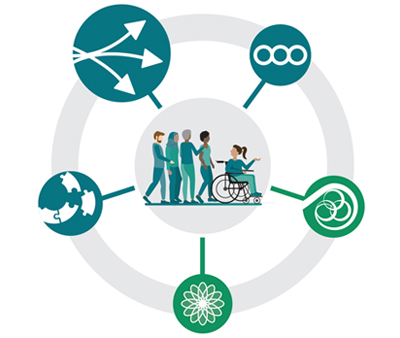Partnerships for Better Health – CIHR-ICRH Strategic Plan 2022-2025
Strategic Plan in Action
- The Challenge
- A Framework for Decision-Making
- A Unifying Approach
- Priority A: Preparing Future Capacity
- Priority B: Accelerating Knowledge Through Collaboration
- Priority C: Catalyzing Impact Through Knowledge Mobilization
- Theme 1: Strengthening Indigenous Health Research
- Theme 2: Enhancing Equity, Diversity and Inclusion in Health Research
- Strategic Plan in Action

Heart Failure Research Network
In Canada, many health conditions are overrepresented among racialized groups and Indigenous Peoples in comparison to other communities.
To strengthen IHR in areas of need, the Institute incorporates Indigenous-led requirements within many of its strategic funding opportunities such as the Heart Failure (HF) Research Network (The Network). The Network includes an Indigenous-led research team along with the cross-cutting platform to address Indigenous health and wellness to strengthen Indigenous research and knowledge sharing activities.
In addition, the Network brings together an interdisciplinary group of people from across Canada including patients, PWLE, family/caregivers, Indigenous Elders or Knowledge Keepers, government, policy makers, not-for-profit organizations, health care providers, researchers, clinicians and industry. Together, this dynamic group will focus on HF across the lifecycle, within various health delivery settings (including hospitals, primary care, home and community care as examples) and in the context of multimorbidity, health disparities and Indigenous health and wellness.
The Network activities also includes training and capacity development, KM and patient and citizen engagement.
The HF Research Network is a $5M investment over five years collectively supported by five CIHR Institutes* and the Heart and Stroke Foundation of Canada in partnership with Mitacs and the National Institutes of Health – National Heart, Lung, and Blood Institute (NIH-NHLBI).
*CIHR Institutes of Aging (IA); Circulatory and Respiratory Health (ICRH); Gender and Health (IGH); Health Services and Policy Research (IHSPR); Infection and Immunity (III); Indigenous Peoples’ Health (IIPH).

Sleep Research Consortium
In combination with diet, exercise and other personal choices made by Canadians, sleep is a critical component of primary disease prevention and promotion of wellness.
In 2022, in partnership with four other CIHR Institutes* and Eisai Limited, ICRH led the development of a unique $5 million, five-year initiative: the Sleep Research Consortium.
Funding sleep research using a consortium model enabled the support of individual research teams that focused on specific research areas relevant to sleep hygiene and insomnia while at the same time providing a framework for coordination of key crosscutting activities among the research teams. The cross-cutting activities included capacity development, health disparities and equity, Indigenous health and wellness (such as connections to culture and ceremony), data management and KM. The active coordination of the cross-cutting activities will be managed by a Coordination and Knowledge Mobilization Centre (CKMC). The CKMC is designed to ensure the collective benefits of research are realized and to maximize the mobilization of knowledge within and beyond the Sleep Research Consortium research teams.
*CIHR Institutes of Aging (IA); Circulatory and Respiratory Health (ICRH); Human Development Child and Youth Health (IHDCYH); Indigenous Peoples’ Health (IIPH); Neurosciences Mental Health and Addiction (INMHA).

Transitions in Care Initiative
The Transitions in Care (TiC) Initiative is an over $35M multi-component collaboration started in 2017, which is designed to improve the health and wellness of all people in Canada by supporting research that transforms the health system to optimize the outcomes of individuals experiencing transitions in care.
In their lifetime, every Canadian will experience many transitions in care, whether as a client, patient, caregiver, family member and/or as a member of a community that experiences challenges accessing care. To address these challenges, the TiC Initiative was developed through strategic partnerships within CIHR* and a diverse group of external partners**. The TiC Initiative included several funding components that addressed knowledge gaps, identified evidenced-based practices and supported the embedding of health system decision-makers within implementation science teams to address TiC challenges. Supported activities were to include the intersection of two of the three TiC focus areas (across the lifecycle, changing health status or care and key populations to optimize transition in care outcomes), integrate CIHR’s commitment to the health and wellness of Indigenous Peoples and racialized group, and develop relevant research capacity.
*CIHR Institutes of Aging (IA); Cancer Research (ICR); Circulatory and Respiratory Health (ICRH); Gender and Health (IGH); Human Development, Child and Youth Health (IHDCYH); Health Services and Policy Research (IHSPR); Indigenous Peoples’ Health (IIPH); Musculoskeletal Health and Arthritis (IMHA); Neurosciences, Mental Health and Addiction (INMHA); and the CIHR Strategy for Patient Oriented Research (SPOR).
**Alberta Innovates, the Azrieli Foundation, the Canadian Frailty Network, the Canadian Space Agency, the European Commission, Greg’s Wings, the New Brunswick Health Research Foundation, Mitacs and the Rossy Foundation.

Health Research Training Platforms
The Health Research Training Platforms (HRTPs) are designed to ensure that health research trainees and early career researchers are best positioned to navigate a dynamic health research landscape with evolving research directions, practices and technologies.
Of the 13 unique HRTPs launched in 2022 (a total investment of $31.1M over six years), the Institute partnered on two.
The Improving Health Outcomes through Better Models of Care for Multimorbidity* platform focuses on the development of trainees on the design, implementation and evaluation of health system or service interventions that improve the prevention, treatment and management of multimorbidity. This HRTP embeds experiential learning opportunities, networking, as well as training and mentoring of fellows and clinical researchers.
The Vascular Cognitive Impairment** platform prioritizes developing capacity across the CIHR research themes to unravel the complexity of, and changes to, blood flow to the brain as it relates to vascular cognitive impairment, including vascular dementia in ageing populations. This HRTP includes training on patient-oriented, team-based and translational research.
* CIHR Institutes of Circulatory and Respiratory Health (ICRH); Health Services and Policy Research (IHSPR).
** CIHR Institutes of Aging; Circulatory and Respiratory Health (ICRH); Neurosciences, Mental Health and Addiction (INMHA).
- Date modified: